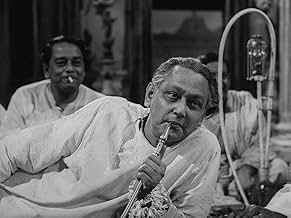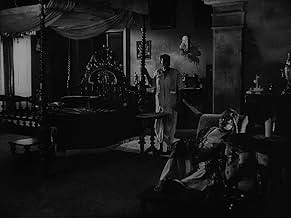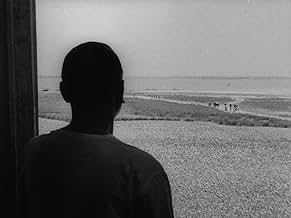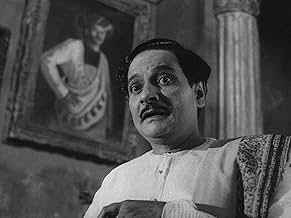Aggiungi una trama nella tua linguaDepicts the end days of a decadent zamindar (landlord) in Bengal, and his efforts to uphold his family prestige even when faced with economic adversity.Depicts the end days of a decadent zamindar (landlord) in Bengal, and his efforts to uphold his family prestige even when faced with economic adversity.Depicts the end days of a decadent zamindar (landlord) in Bengal, and his efforts to uphold his family prestige even when faced with economic adversity.
- Regia
- Sceneggiatura
- Star
- Premi
- 3 vittorie e 2 candidature totali
- Mahamaya, Roy's wife
- (as Padma Devi)
- Singer
- (as Begum Akhtar)
- Ustad Ujir Khan
- (as Ostad Wahed Khan)
Recensioni in evidenza
There is something savage, auto-destructive but also the purest in form about the landlord's passion for music and childish vanity in front of his peers, which made me ponder over the place of music in our society long after the credits end. In the age of MTV and MP3, we are used to the idea of carrying routinely our favorite songs everywhere from streets to bathroom, and it's pity that we hardly experience anymore the authentic ambiance of intimate music gathering such as miraculously acted and filmed in Jalsaghar. Music in other era and other place must have been high point and extra-ordinary moment of community life, source of the spiritual inspiration for civil life as well as its destruction. The decor and lighting of the music room is sumptuous and otherworldly, in perfect contrast with the wearisome monotony of domestic scenes the declining aristocrat is forced to endure.
Satyajit Ray is one of the greatest directors of all-time and The Music Room is his masterpiece. Correction: The Music Room is a masterpiece of world cinema.
How to describe this movie? In Hollywood lingo, you could call it Citizen Kane meets Black Narcissus with a big dose of King Lear. Of course, if you called it that, they'd shelve the project and spend the money on the sequel to XXX.
Pity poor Biswambhar Roy, a king in a lonely castle. He's lost not only his family but his entire way of life. He is a mistake. A forgotten man waiting in his empty shell of a world.
He spends the last remnants of his once vast fortune on a final, lavish musical performance in his crumbling home, a last-ditch attempt to connect to the pride and joy he once felt in his life.
Not that he is innocent. He is proud and oblivious, spoiled and selfish. But surely not a bad man. Merely a displaced man. So we can cheer as he is granted one last moment of happiness and weep for him as he meets his inevitable end.
How is that Satyajit Ray remains unknown even to many die-hard cineastes in the States? I hope one of the companies will come along soon and release some of his work on DVD.
I loved seeing and hearing the various musical instruments, the wonderful vocalizations, and the performances - especially that dancer towards the end - they were something special. The rest of it had meaning, but was less compelling for me, despite all the craft and attention to detail director Satyajit Ray put in. It would have been more interesting had we had gotten more depth and insight into some of the other characters. Certainly worth watching though.
Lo sapevi?
- QuizThe film is included on Roger Ebert's "Great Movies" list.
- BlooperAfter talking to his wife about the cost of the music party, a close-up shows the landlord falling asleep with his hand bent down at the wrist. After the cut to medium, his hand lies straight up in his neck.
- Citazioni
Huzur Biswambhar Roy: [laughing drunkenly, deriding the moneylender's son, Ganguly] He failed. He failed!
Huzur Biswambhar Roy: [now talking to his servant Ananta, who is refilling his glass with liquor] He couldn't do it. He couldn't do it! That moneylender's son! He wanted to be king of the mountain. What arrogance, huh? What arrogance! A dwarf reaching for the moon! He couldn't do it. You know why he failed?
Huzur Biswambhar Roy: [speaking directly to Ananta] Blood! The blood in my veins! You know whose blood flows in my veins? You want to see? Come...
Huzur Biswambhar Roy: [proceeding to point out portraits on the wall of his elders] My father... my grandfather... my great grandfather... my great-great grandfather.
- ConnessioniFeatured in Celluloid Man (2012)
I più visti
- How long is The Music Room?Powered by Alexa
- What calendar do they use?
- What is the significance of the "thread ceremony"?
- What is a zamindar?
Dettagli
- Data di uscita
- Paese di origine
- Sito ufficiale
- Lingue
- Celebre anche come
- La sala della musica
- Luoghi delle riprese
- Nimtita Rajbari, Nimtita, West Bengal, India(The House)
- Azienda produttrice
- Vedi altri crediti dell’azienda su IMDbPro
Botteghino
- Lordo in tutto il mondo
- 3247 USD
- Tempo di esecuzione1 ora 40 minuti
- Colore
- Mix di suoni
- Proporzioni
- 1.37 : 1
Contribuisci a questa pagina













